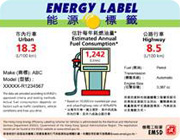ENERGY SAVING TIPS
Fuel Saving Tips for Cars
Advice on Selecting a Car
The decisions you make when buying a car will save you fuel for years to come:
Do you need a car? - Consider public transportation or walk to your regular destinations instead of driving.
Buy a car with right capacity and engine size - If you're shopping for a new car, it's time to re-evaluate the size of car you really need. Smaller cars are inherently more fuel-efficient, the penalty for any excess is extra fuel expenses.
Consider buying alternative fuel vehicles - They usually consume less fuel and produce less greenhouse gas and pollutants.
Advice on Using a Car
If you drive less and use your car more efficiently, you can save fuel:
Plan your journey. Avoid congested roads, steep hills, road construction, etc. Group short journeys and minimize idling time of your car.
Do not drive for short trips - Consider public transportation or walk to a nearby destination.
Share your car with others - Take on neighbours, friends or colleagues who travel on the same route, or take the car of others and leave your car at home.
Park-and-ride at railway station - Use public transportation as often as possible. Drive only for trips where no public transportation is available.
Advice on Energy Efficient Driving
You save fuel if you observe some good practices in driving and maintenance, such as:
Drive Sensibly - Accelerate smoothly and maintain a steady speed. Avoid unnecessary acceleration and over-speeding, because aggressive driving (speeding, rapid acceleration and braking) wastes fuel. Sensible driving is also safer for you and others, so you may save more than fuel money.
Switch off when idling - Drive off as soon as possible after starting. Switch off your engine if you are idling for a long time.
Do not carry unnecessary articles or car fittings - The extra weight results in fuel wastage and unnecessary emissions.
Maintain your car properly - A vehicle that is well maintained means it will operate with greater efficiency. This not only improves your overall vehicle performance, but it will improve your fuel economy as well. Service your car regularly and keep it well tuned. Keep your car in top operating condition.
Maintain correct tyre pressure - Under-inflated tyres have more rolling resistance, which means you need to burn more fuel to keep your car moving. Inspect your tyres regularly and inflate them to the correct pressure as recommended by the manufacturer.
Check your air filter - A dirty air filter restricts the flow of air into the engine, which harms performance and economy. Air filters are easy to check and change; remove the filter and hold it up to the sun. If you can't see light coming through it, you need a new one.
Use the highest gear possible - Cars are designed to start in the lowest gear possible because that's where they have the most power, but that power translates to an increase in fuel consumption. To improve your fuel economy, drive in the highest gear possible when you are cruising at a steady speed, such as on the highway.
Never exceed legal speed limit - Primarily they are set for your travelling safety, however better fuel efficiency also occurs. Travelling at legal speed limit give you better mileage when compared to speeding.
Think clean - Keeping your car washed and waxed improves aerodynamics and therefore affects fuel economy.
Use or not air conditioner - Running your air conditioner does cause your vehicle to consume more fuel, but driving with your windows rolled down can be even worse due to the increase of drag on the vehicle. If you are driving slowly, such as around town or in city traffic, then you are better off leaving your windows open, if at all possible. For highway driving, roll up the windows and turn the air conditioning on.
Picking a fuel-efficient car can save fuel - compare using the Energy Labels. If you observe some useful guidelines in choosing and using your car, you can minimize fuel consumption as well as the emission of pollutants and greenhouse gas.
Energy Efficiency Labelling Schemes for Vehicles
The fuel consumption of a car usually depends on the way it is driven, so the Energy Label contains information on:

- Urban fuel consumption
- Highway fuel consumption
- Estimated annual fuel consumption assuming annual travel of 4,000 km in urban areas and 6,000 km in sub-urban areas or highways and other important data relevant to the car. For all three fuel consumption data on the label, a smaller value represents a lower fuel consumption.
This is a "comparison type" energy label so that no energy efficiency grade or minimum energy efficiency requirements is available. Instead, the label will provide useful fuel consumption data for comparison purpose. Data on the energy labels are based on standardized fuel consumption test procedures to give you the confidence of comparing energy efficiency under identical conditions. However you should note that the actual fuel consumption when you use the car depends on factors such as traffic conditions, the condition of the car and how you drive.